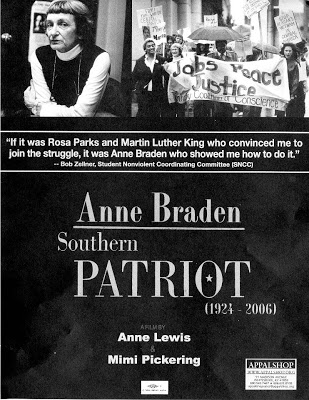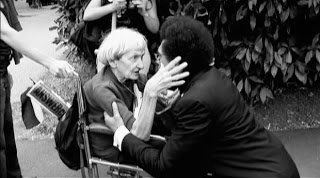Anne Braden: Southern Patriot:
A film by Anne Lewis and Mimi Pickering
By William Michael Hanks | The Rag Blog | July 14, 2012
“The meaning of life is in that struggle which human beings have always been able to do — to envision something better… that’s what makes human beings divine.” — Anne Braden
If you find yourself in Austin Wednesday, July 18, be sure to see the screening of Anne Braden: Southern Patriot. This significant new documentary — directed by Anne Lewis and Mimi Pickering and released by Appalshop Films — is being presented by the Austin Film Society and The Texas Observer at the Alamo Drafthouse South, 1120 South Lamar in Austin, at 7 p.m.
Anne Lewis, who is a senior lecturer at the University of Texas at Austin and a contributor to The Rag Blog, will be at the screening to discuss the film. There have also been recent screenings of Anne Braden: Southern Patriot in San Jose and San Francisco, California.
Who is a “patriot”? The Minute Men, the Continental Army in Valley Forge, Jefferson and Adams debating on the floor of Congress, or maybe the volunteer who serves her country in time of war?
Perhaps, but the one thing that all patriots share is a love of their country and the courage to fight for what they believe in — to fight for their personal vision of a better America. That is, and will always be, the definition of true American patriotism.
At the close of World War II, America needed patriots. The poor and people of color were on the bottom rung of the ladder with no hope of advancement — America was an apartheid state. True American patriots who would see a better way and risk their blood and treasure to move us towards a better world were needed more than ever.
America’s pastime, baseball, was integrated in 1946 when Branch Rickey signed Jackie Robinson to play for the Brooklyn Dodgers. But racism in America was far from over. Two years later, Anne McCarty married Carl Braden and they began a lifetime of activism together. Through the lens of Anne Braden’s life we see the challenges and victories of the civil rights movement.
(Along with her husband Carl, Anne Braden, who died in 2006, edited the iconic Southern Patriot newspaper, published by the Southern Conference Educational Fund.)
In 1954 Anne and Carl bought a house for a black family in a white neighborhood. That set in motion an unimaginable sequence of events that swept Anne into the spotlight, accused of being a communist, and sent her husband, Carl, to prison for sedition against the state. In time it was held that sedition was a federal crime, not prosecutable by the state, and Carl was set free. But, by then, Anne Braden had a glimpse of a better America and worked tirelessly throughout her life to see it became a reality.
There are several remarkable things about this documentary. The technique of the first person narrative is used throughout the film and it flows seamlessly from one person to another as the story of the civil rights struggle throughout the South unfolds. Iconic footage of civil rights demonstrations is intercut with reflections by Anne Braden and other civil rights workers, former co-workers, and scholars — including Cornel West and Angela Davis — descriptions of how they were vilified and branded “communists” for trying to realize a better vision of America.
The first-person technique requires rigorous discipline in editing to keep the narrative flowing through the voices of different persons. Anne Braden: Southern Patriot is an outstanding example of that challenging form. Anne Lewis and Mimi Pickering are both award-winning filmmakers and this film is a landmark work in both content and style.
Who was Anne Braden? In the 1950’s she was a young woman with a determination to follow her conscience. She was born in Louisville, Kentucky, and moved with her family to Alabama where she enjoyed the privileged life of a child of the middle class. As a young girl, she began to notice the disparities in race relations and she began to develop an active social conscience. A conscience that would not let her stand by and look the other way. Her life is an example of right action — pursuing the vision of a better world.
Anne Braden:
The meaning of life is in that struggle which human beings have always been able to do — to envision something better… that’s what makes human beings divine.
Anne Braden’s life touched others and inspired them to action. Bob Zellner describes his first experience as an organizer in the South:
My first job at SNCC was to head a campus traveling program. The first staff meeting I went to was in McComb, Mississippi, where a freedom march was being planned. I joined the march and was beaten, arrested, and almost lynched that first meeting. They kept calling me a god-damned, nigger-lovin’, son of a bitch Jew from New York. And I said well, nine out of 10 is not bad but I’m not from New York!
Anne had taught us you could be for an open political discussion… you can be for integration… and you could still be a good person… a normal person. If it was Rosa Parks and Martin Luther King who convinced me to join the struggle, it was Anne Braden who showed me how to do it.
Anne Braden:
The real danger comes from people in high places, from the halls of Congress to the boardrooms of our big corporations, who tell white people that if their paychecks are eaten up by taxes it’s not because of our bloated military budget but because of government programs that benefit black people. If young whites are unemployed, it’s because blacks are getting all the jobs. Our problem is the people in power who are creating a scapegoat mentality. That’s what is creating the danger of a fascist movement in America.
Anne Braden sensed that what she faced in Alabama was the same fascism that the Allies had just announced a victory over in WWII. In an eerie echo of the recent past, the words of Herman Goering, Hitler’s Third Reich Marshall at the Nuremberg trials offer a key to understanding the dynamics in Alabama. He speaks of “war” but substitute any government policy and the formula still works:
Naturally, the common people don’t want war, but after all it is the leaders of a country who determine the policy. And, it is always a simple matter to drag people along, whether it is a democracy or a fascist dictatorship, or a parliament, or a communist dictatorship, voice or no voice, the people can always be brought to the bidding of the leaders. This is easy. All you have to do is tell them they are being attacked and denounce the pacifists for lack of patriotism and exposing the country to danger. It works the same in every country.
This simple, age-old, and effective strategy has been used by our leaders, particularly since WWII and the “Communist threat,” to suppress dissent and silence voices of righteous anger. But, it did not silence Anne Braden.
Faced with an intractable segregationist power structure in Alabama, Anne and Carl Braden set about doing what they could for social justice in spite of it. Nothing seemed to stop her. She was inspired by a glimpse of something better — a better life for blacks and whites — and she saw no reason why it should not be.
When she heard Martin Luther King portrayed as a “dreamer,” Anne insisted that “Martin Luther King was not a dreamer, he was a revolutionary.” and she would quote MLK’s Riverside Church speech: “True compassion is more than flinging coins to a beggar… true compassion realizes that a society that produces beggars needs to be entirely restructured.”
Anne Braden: Southern Patriot is a wellspring of intellectual reason, a blueprint for action, and it includes some of the most iconic footage from the civil-rights movement ever seen. Here Anne Braden describes her discovery of a simple but effective strategy:
If you use every attack as a platform, they can’t win and you can’t lose. If they leave you alone you keep on organizing, if they attack you, you have a platform to reach a lot more people, so you really can’t lose.
In 1965 President Lyndon Johnson signed the most sweeping civil rights legislation in U.S. history and Dr. Martin Luther King won the Nobel Peace Prize. But civil rights workers were murdered in Mississippi, and beaten in Birmingham and Selma. The struggle goes on. Each generation must shoulder the responsibility of providing oversight to their government. And if we don’t, the inexorable concentration and abuse of power will continue.
Jackie Robinson retired after the 1956 season, before the Dodgers left Brooklyn for Los Angeles. Twenty five years after his historic debut, Jackie Robinson, the grandson of a slave, agreed to throw out the first ball of the 1972 World Series. He was dissatisfied with the progress of race relations. “As I write this 20 years later, and sing the anthem, I cannot salute the flag. I know that I am a black man in a white world. In 1972, in 1947, at my birth in 1917, I knew that I never had it made.”
So, what do we do if our founders do not rise from the grave to set our country right? We do what they intended us to do — rise from our slumber and act — if we have the conscience and the fortitude — if we have the guts.
The ills that are imbedded in the darker angels of human nature, are in turn reflected in society. We may trace the disease of social oppression through history. And, as certainly as a physical disease diminishes the body, so do societal ills diminish the body politic.
It’s not surprising that most of our so-called leaders are afflicted with pride, avarice, and self interest; that is to be expected — power corrupts. But it is for that very reason that the conscience of the people must call on the brighter angels of our nature.
We are at a crossroads in America — a crises of conscience. Fortunately, there is a simple, effective cure. Really, all we have to do is follow the example of Anne Braden.
Anne Braden: Southern Patriot, a documentary by Anne Lewis and Mimi Pickering, will screen at the Alamo Drafthouse South, 1120 S. Lamar, Austin, Texas at 7 p.m., Wednesday, July 18. Don’t miss it.
For ticket information: The Austin Film Society.
[William Michael Hanks has written, produced, and directed film and television productions for the National Aeronautics and Space Administration (NASA), the U. S. Information Agency, and for Public Broadcasting. His documentary film, The Apollo File, won a Gold Medal at the Festival of the Americas. Mike, who worked with the original Rag in Sixties Austin, lives in Nacagdoches, Texas. Read more articles by Mike Hanks on The Rag Blog.]





















Good article, Mike. Thanks.
– L.P.
Enjoyed the article; looking forward to the film showing. Let’s be clear: white people have a responsibility to fight against white supremacy among white people. Anne Braden was on target with that for most of her adult life.
Anne Braden showed how one person with a social conscience and the courage to act can make a huge difference. Thanks to Anne Lewis and Mimi Pickering for giving us a window into Anne Braden’s life.